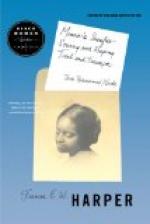“Why, the Lord, of course.”
“And who made you?”
“He made me, too.”
“Are you sure that you did not make yourself?”
“Why, of course not,” said Annette with an accent of wonder in her voice.
“Does God ever make any mistakes?”
“Why, no!”
“Then if any one calls you black, why should you get angry? You say it would not make Miss Joseph angry to say she looked white, or red and rosy.”
“I don’t know; I know I don’t like it and it makes me mad.”
“Now, let me explain the reason why it makes you angry to be called black. Suppose I were to burn my hand in that stove, what would I have on my hand?”
“A sore place.”
“If it were your hand, what would you do?”
“I would put something on it, wrap it up to keep from getting cold into it and try to get it well as soon as I could.”
“Well, that would be a very sensible way of dealing with it. In this country, Annette, color has been made a sore place; it has been associated with slavery, poverty and ignorance. You cannot change your color, but you can try to change the association connected with our complexions. Did slavery force a man to be servile and submissive? Learn to hold up your head and respect yourself. Don’t notice Mary Joseph’s taunts; if she says things to tease you don’t you let her see that she has succeeded. Learn to act as if you realized that you were born into this world the child of the Ruler of the universe, that this is his world and that you have as much right in it as she has. I think it was Gilbert Haven, a Bishop of the Methodist Episcopal Church, a man for whose tombstone I do not think America has any marble too white or any laurel too green, who saw on his travels a statue of Cleopatra, which suggested to him this thought, ’I am black, but comely, the sun has looked down upon me, but I will make you who despise me feel that I am your superior,’ and, Annette, I want you to be so noble, true and pure that if everybody should hate you, that no one could despise you. No, Annette, if Miss Joseph ever attempts to quarrel with you don’t put yourself on the same level by quarreling with her. I knew her parents when they were very poor; when a half dozen of them slept in one room. He has made money by selling liquor; he is now doing business in one of the most valuable pieces of property I see in East L street. He has been a curse, and his saloon a nuisance in that street. He has gone up in property and even political influence, but oh, how many poor souls have gone down, slain by strong drink and debauchery.”
Chapter IX
True to his word, Mr. Thomas applied to Mr. Hastings, the merchant, of whom he had spoken to his young friend. He went to his counting-room and asked for a private interview, which was readily granted. They had kindred intellectual and literary tastes and this established between them a free masonry of mind which took no account of racial differences.




